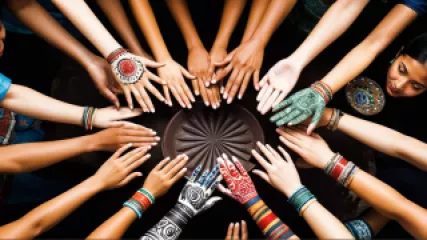10 Best Ways to Strengthen Your Cultural Identity
10 Best Ways to Strengthen Your Cultural Identity
In a world that is becoming increasingly globalized, it's more important than ever to maintain a strong sense of cultural identity. Your cultural identity is the foundation of your values, beliefs, and sense of belonging. It shapes who you are and how you interact with the world around you. However, navigating the complexities of a multicultural society can be challenging, and it's not uncommon to feel disconnected from your cultural roots. In this article, we'll explore 10 effective ways to strengthen your cultural identity and empower yourself in the process.
1. Immerse Yourself in Your Cultural Traditions
One of the most powerful ways to strengthen your cultural identity is to immerse yourself in your cultural traditions. This can include attending cultural festivals, participating in traditional ceremonies, or learning to cook authentic dishes from your heritage. By engaging in these activities, you'll not only deepen your understanding of your culture but also develop a stronger sense of belonging and pride.
2. Learn Your Native Language
If your native language is not your primary language, make an effort to learn and practice it. Language is a fundamental part of cultural identity, and being able to communicate in your native tongue can help you connect with your roots in a more profound way. Consider taking language classes, listening to native-language music, or finding a language partner to practice with.
3. Explore Your Family History
Delving into your family history can be a powerful way to connect with your cultural identity. Trace your ancestors' journeys, learn about their traditions and values, and share their stories with your loved ones. This can help you develop a deeper appreciation for your cultural heritage and a stronger sense of belonging.
4. Surround Yourself with Cultural Artifacts
Surrounding yourself with cultural artifacts, such as artwork, textiles, or religious symbols, can be a powerful way to immerse yourself in your cultural identity. Display these items prominently in your home or workspace, and use them as conversation starters to share your cultural heritage with others.
5. Engage in Cultural Arts and Crafts
Participating in cultural arts and crafts, such as painting, weaving, or pottery, can be a deeply meaningful way to connect with your cultural identity. These creative pursuits often have deep roots in cultural traditions and can help you develop a greater appreciation for your heritage.
6. Attend Cultural Events and Gatherings
Attending cultural events and gatherings, such as cultural festivals, community meetings, or religious ceremonies, can be a great way to connect with others who share your cultural identity. These events often provide opportunities to learn, participate, and celebrate your cultural heritage.
7. Read and Explore Cultural Literature
Reading literature, poetry, or essays that reflect your cultural heritage can be a powerful way to deepen your understanding and appreciation of your cultural identity. Seek out works by authors, poets, or scholars from your cultural background, and let their words inspire and guide you.
8. Engage in Cultural Advocacy and Activism
Becoming involved in cultural advocacy and activism can be a powerful way to strengthen your cultural identity and contribute to the greater good. Whether it's supporting policies that promote cultural diversity, or raising awareness about cultural issues, your involvement can help empower your community and foster a greater sense of unity.
9. Share Your Cultural Identity with Others
Sharing your cultural identity with others, whether it's through storytelling, teaching, or simply engaging in cultural exchange, can be a powerful way to strengthen your own sense of identity. By educating and sharing your cultural heritage with others, you can help build greater understanding and appreciation for the diversity of human experience.
10. Embrace the Fluidity of Cultural Identity
Finally, it's important to remember that cultural identity is not a static concept. It is a dynamic and evolving process that is shaped by our experiences, interactions, and the changing world around us. Embrace the fluidity of your cultural identity, and be open to exploring new ways of expressing and celebrating your heritage.
In conclusion, strengthening your cultural identity is a deeply personal and rewarding journey. By immersing yourself in your cultural traditions, learning your native language, exploring your family history, and engaging in cultural arts and activism, you can develop a stronger sense of belonging and empowerment. Remember, your cultural identity is a unique and valuable part of who you are, and it deserves to be celebrated and nurtured.






